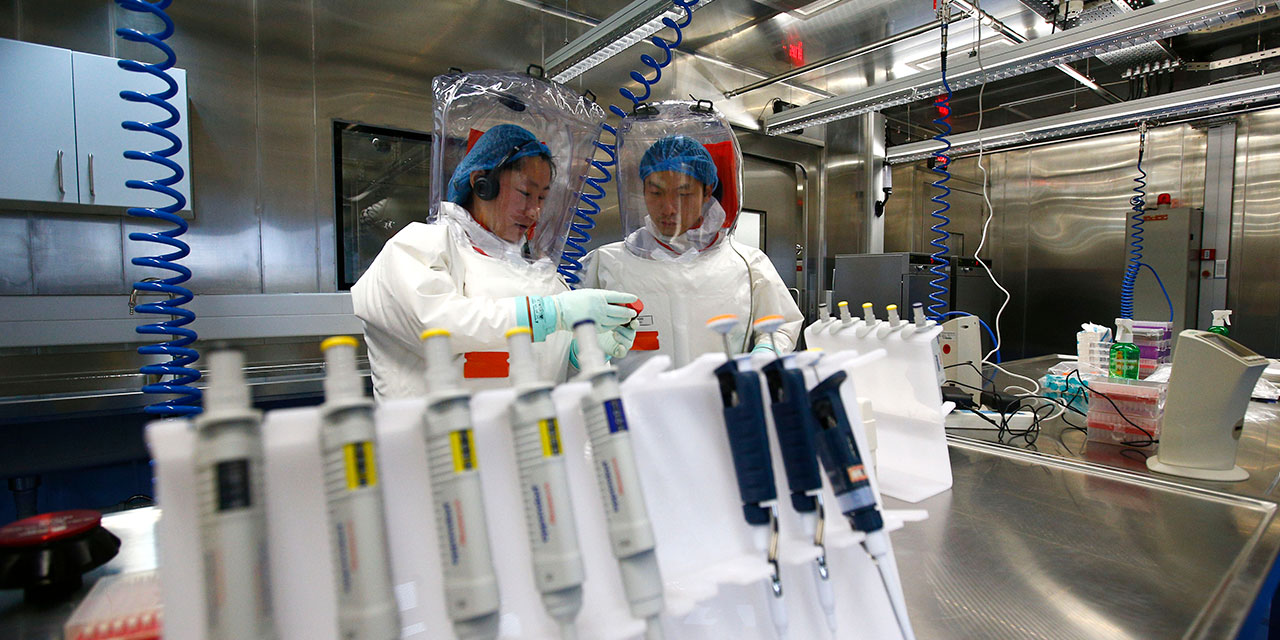
A bioweapons expert likely to head the Trump administration’s top Pentagon post for countering weapons of mass destruction has charged in a new report that the Covid-19 pandemic was probably the result of a military-research-related accident in a Chinese laboratory, and that work at that lab may have been part of research China was conducting in possible violation of a treaty banning biological weapons.
The report also asserts that China knew even before the outbreak that the SARS-CoV-2 virus appeared to have severe, enduring neurological effects. “The risk of further neurological injury as the result of subsequent reinfection is unclear and should be an urgent research priority,” the report concludes.
Finally, a reason to check your email.
Sign up for our free newsletter today.
The 172-page report was written by Robert Kadlec, a bioweapons expert and career Air Force officer whom President Trump has nominated as Assistant Secretary of Defense for Nuclear Deterrence, Chemical & Biological Defense Policy & Programs, the Defense Department’s most senior post overseeing efforts to combat WMD threats. He has previously served in Republican administrations and is well regarded for his expertise. If confirmed by the Senate, which is probable, he will be in a position to help shape policy on countering Chinese nuclear and biological threats.
Kadlec asserts that there is no evidence that the SARS-CoV-2 virus was deliberately released. But while illicit research aimed at developing bioweapons is extremely difficult to detect and prove, his report cites what he calls “concerning writings by Chinese military strategists indicating an interest in biology’s potential as a weapon,” including bacteria and viruses, even after it joined the treaty banning bioweapons in 1984. The SARS-Covid virus released from the lab in China may well have been part of that offensive bioweapons effort.
Kadlec’s report, published today by the Scowcroft Institute of International Affairs at Texas A & M University’s Bush School of Government & Public Service, concludes that China’s troubling research, its lack of transparency, and its systematic efforts to cover up the possible lab leak and other bio-security problems at high-containment labs justify prioritizing U.S. intelligence efforts aimed at Chinese bioweapons research—as well as developing enforceable safety standards for labs that conduct dual-use research around the world. While voluntary standards exist, there is presently no enforced system for safety measures globally.
“Accidents are a constant risk, and, without extreme precaution, inevitable,” Kadlec warns. “New facilities attract funding and attention, but maintenance and biosafety workforce development receive much less of either.”
Kadlec’s report adds to the growing consensus that the pandemic, which killed 7 million people and sparked untold economic and political havoc, was the result of a leak at the Wuhan Institute of Virology and not a naturally occurring outbreak of a deadly virus originating in animals. The U.S. government and other scientists initially insisted, and some continue to insist, that the Covid-19 pandemic was such a naturally occurring event. Writing in City Journal, Nicholas Wade, a veteran New York Times science writer and author, argued that the case for natural infection was weak, despite its embrace by much of the mainstream press and top U.S. public health officials—including Anthony Fauci, former director of the National Institute of Allergy and Infectious Diseases, and Francis Collins, former director of the National Institutes of Health.
Andrew Weber, a former assistant defense secretary in the Obama administration now at the Council on Strategic Risks, said that Kadlec’s report adds to the “scientific and documentary evidence for an accidental release” of the virus, and highlights the need for the U.S. and other countries to implement “stringent safety measures and limit risky biological research.”
The report’s most contentious claim is that Chinese military scientists understood that the virus had “acute and chronic” short- and long-term effects on the brain and may have been working not only to weaponize the virus but also to develop a vaccine to counter its effects even before the outbreak. “This is the report’s most provocative finding and one worth taking seriously,” conclude Andrew S. Natsios, the Scowcroft Institute’s director, and Glen A. Laine, the director of the DeBakey Institute, in an introduction to the report.
To support his hypotheses, Kadlec cites patent applications, requests for medical equipment, published and unpublished Chinese research, tips from Chinese dissidents, emails, and other evidence that suggests the possibility that Chinese military scientists were working on a SARS-CoV-2 weapon to attack the brain, and that this “offensive biological weapons (BW) research occurring in China” was linked “to the creation of the SARS-CoV-2 virus” at Wuhan.
Chinese scientists, he writes, had been interested in using biology to manipulate the brain’s functions—or neurocognition—at least since 2006. China’s People’s Liberation Army came to believe that advances in this area could “change the character of conflict” and allow “biology-enabled warfare.” By 2015, Kadlec writes, citing Chinese sources, the belief that battlefield success would require not only “biological dominance but also mental/cognitive dominance” had become part of Chinese military strategy and doctrine. “Writings assert that the human brain will become a new combat space,” he asserts.
Kadlec’s report “strengthens the case not only for a lab leak, but also for the argument that Chinese officials were aware of the safety concerns at Wuhan,” said Richard J. Danzig, a former Navy secretary and biological weapons expert. “Kadlec cites several visits to Wuhan around the time of the leak.”
In an email, Wade said that the most compelling new documentary evidence surrounds a 2018 grant proposal to the Defense Advanced Research Projects Agency, or DARPA, the Pentagon’s think tank, initially disclosed in 2021. In its proposal, called DEFUSE, a team of Chinese and American researchers described how to engineer a virus with the exact properties of the SARS CoV-2. While the Pentagon rejected the proposal, Kadlec cites information suggesting that the Chinese scientists went ahead with the work on their own.
Finally, Kadlec stresses the need for expanded research on the virus’s effects. While resistant to conspiracy theories, his report should deepen the convictions of those who have argued for years that official explanations of Covid’s origins are dubious at best.
Photo: Yin Gang Xinhua/eyevine/Redux
Source link















